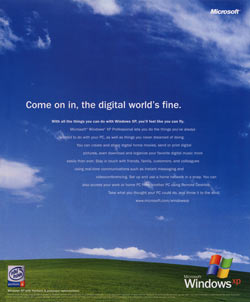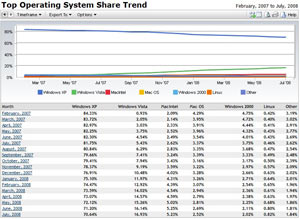Vista Annoyances Resolved
[Page 2] Background Information
As noted in the Introduction, the primary consideration in this article is the presentation of facts and useful information - there are enough poorly-written half-baked opinion pieces about Vista littering the Internet without me adding another lengthy entry to that long list. Before we move on to our look at Vista's annoyances and solutions, I think it's important to examine why almost every article and discussion on Vista is only exceeded in its misguided passion by its inaccuracies. Accordingly, this section first provides some key background facts and statistics regarding both Windows XP and Vista, to put the whole issue into better context before we move onto the the next section.
I recommend that you read this section and the next one, but if you're really not interested right now, you can skip straight to the Annoyances & Solutions section on page 4 to get stuck into the practical solutions I provide for common Vista annoyances, or the Reasons to Use Vista section starting on page 7 if you're not a Vista user.
Key Dates
Let's have a quick recap of some key dates in the history of both Windows XP and Windows Vista:
Windows XP
Windows XP's development started in 1999, based on Windows 2000 and the NT architecture. Codenamed 'Whistler' until officially titled Windows XP in February 2001, it hit Beta 1 in October 2000, Beta 2 in March 2001, Release Candidate 1 in June 2001, and finally Release Candidate 2 in July 2001.
Windows XP was released to manufacturing in August 2001, and available at retail on 25 October 2001.
Windows XP Service Pack 1 (SP1) was released in September 2002, SP2 came in August 2004, and SP3 became available in May 2008.
Microsoft ceased new retail sales of Windows XP on 30 June 2008, mainstream support will end on 14 April 2009, extended support (mainly security updates) will end on 8 April 2014.
Windows Vista
Windows Vista's development commenced in July 2001, a few months prior to XP's release. Initially codenamed 'Longhorn' until 2005, Vista was repeatedly pushed back from its original release date of 2003, losing several key features along the way, such as WinFS.
Beta 1 of Vista was available in July 2005, but only to IT professionals. By June 2006 Beta 2 was released to the general public, September 2006 saw Release Candidate 1 and October 2006 ushered in Release Candidate 2, the final pre-release version of Vista to be made publicly available. In November 2006 Vista was completed and released to manufacturers, and on 30 January 2007 it was officially available for retail purchase.
Windows Vista Service Pack 1 (SP1) for Windows Vista was released in March 2008.
The development of the next version of Windows, currently dubbed 'Windows 7', is covered on the last page of this article. For those interested in the full details of XP's development history see this article, and Vista's development history is chronicled in these articles.
Windows XP's Reception
Most of us know how Vista was greeted upon its release, but how exactly did Windows XP fare soon after it hit the market in late 2001? Indulge me as we take a trip down memory lane.
Upon its release, Windows XP's reception by the public and the media varied. Some of the review sites from 2001 are no longer available, but this CNET review for example gave XP an 8/10, while users on the same site gave it an average rating of 5.7/10. There were various concerns regarding XP's high system requirements, and potential purchasers were warned regarding some of XP's problems when upgrading:
Indeed, XP inherits many of Windows' prior sins--from browser integration to security vulnerabilities--and commits some new ones, such as restricted multimedia formats, limited Java support, product activation, potential privacy troubles, and a hefty price tag.
And then there was this particularly damning indictment of Windows XP:
The software has a fancy new interface, with snazzier colours and all kinds of ingenious shortcuts and bundled software for playing movies, MP3 files and streaming audio and video - in a flagrant repetition of the aggressive software-bundling behaviour that landed the company with an anti-trust suit.
XP is also a Trojan horse that enables Mr Gates and a horde of even less welcome folks to invade your privacy, exploit your computer and empty your wallet.
So why are all these idiots in computer stores drooling at the prospect? Answer: because Windows XP is a monstrous, bloated brute that requires a state-of-the- art PC and two gigabytes of hard disk space before it will even say 'hello'. This means any consumer foolish enough to want to run XP will probably have to buy a new PC.
To add to that, there were also news stories regarding the slow uptake of Windows XP, hinting that it may be a possible sales flop. This is all starting to sound suspiciously familiar.
This Firingsquad review of XP looked at the OS from a gamer's perspective, and while quite positive, it concluded that:
If you're a gamer and are satisfied with Windows 98SE, by all means, don't upgrade and risk losing the ability to play some of your favorite games.
Similarly Techspot's review of XP was again positive on the whole, but stated that:
The new look gets a little cheap looking after awhile, but you can always change to the classic Windows look with a click of a button. I have been using it for a few days now, and I really do not see a need to upgrade from Windows 98/ME. If you are building a new system, then by all means, install Windows XP. If you think that Windows XP is going to revolutionize the way you use a computer and surf the web, wake up and save your money.
Interestingly, when Windows XP Service Pack 1 (SP1) was released a year later, it received even lower scores from CNET at 6/10, and 4.6/10 from users. Even by 2004, three years after XP was released, some people were still voicing how much they hated Windows XP and wanted to revert back to Windows 98/ME.
By August 2004 and the release of Windows XP Service Pack 2 (SP2), professional reviews started to feel that many of Windows XP's problems had been cured. Paul Thurrott voiced what was generally the consensus among experts that SP2 was a worthwhile upgrade. Yet despite this glowing recommendation, user reviews remained mixed, with many people eager to avoid installing SP2 for various reasons, and stories of SP2 "nightmares" abounding.
The above information is provided simply to demonstrate that Windows XP was subject to the exact same types of criticisms and concerns as Windows Vista, many of them totally baseless or sensationalist as we now know. It took roughly three years or more for XP to reach the point (SP2) where users began to start trusting it, and started blaming their errors and problems on things other than the OS itself. As someone who started using Windows XP Professional immediately upon its release in late 2001, I can confirm that as an XP user I was subject to much ridicule and abuse on various forums, primarily because XP was seen as being an "eye candy laden piece of bloatware", compared to the supposedly sleek and efficient Windows 2000, or the allegedly highly reliable Windows 98. Although XP did improve significantly by the time of SP2's release, in truth it was already doing perfectly well for the average user by around SP1, a year after its release. Certainly I was extremely happy with it at that point, using it for browsing, gaming and a range of other functions without a hitch - I had no wish or need to switch back to Windows 98 or ME, despite all the people around me telling me otherwise.
Windows Vista's Market Share
Microsoft has sold 180 million licenses for Windows Vista to July 2008, which certainly disqualifies Vista as one of the 'greatest tech flops in history'. Business adoption of Vista on the other hand has been mixed, with conflicting reports regarding the reasons why some enterprises have not moved to Vista - many are choosing to remain with XP. How much of this is actually based on inaccurate impressions held by tech professionals, or the fact that businesses are typically slow to upgrade unless a pressing need is seen, is unclear. Some portion of it has to do with the fact that Vista does indeed have higher hardware requirements than Windows XP - XP was designed for 2001-era hardware - and some businesses may feel that the added security or functionality is outweighed by the additional costs of upgrading hardware and providing staff training for example.
Certainly as this article points out, this is nothing new:
According to an anonymous tipster close to Intel, the chip giant has decided against upgrading its computers to Windows Vista, and is instead clinging to Windows XP. ...back in 2002, [Intel] announced it would be holding on to Windows 2000 a bit longer, instead of moving over to the superior XP. Many believe that business adoption of XP was very quick, but this is simply a myth.
Furthermore, it's interesting to note that businesses are notorious for not updating to newer technologies in a timely manner, even when it is an absolute necessity. For example business transition to the new IPv6 protocol - a required change given IPv4 addresses could run out as early as 2010 - has been virtually non-existent.
In terms of solid statistics on current market share, estimates place Windows XP at around 70% of the global OS market, while Vista is a distant second at around 17%. From the time of Vista's release on 30 January 2007, the trend has been a decline in XP's share of the OS market, from roughly 84% down to the current 70%, while Vista has risen from just under 1% to its current 17%. Certainly there is no doubt that among consumers and businesses, Windows XP still reigns supreme by a very large margin, however it is clearly in decline as Vista continues to steadily increase its share.
As an interesting aside, we can see Linux has almost doubled its market share during this period, albeit from roughly 0.4% to 0.8%; similarly MacIntel and Mac OS machines still make up only 5.2% and 2.5% of the OS market respectively. However between February 2007 and July 2008 the combined market share for Windows OSes has remained around 90% - it seems Windows users are not switching 'in droves' to other operating systems, despite the somewhat dubious claims that Vista has driven many Windows users away.
Keeping these facts in mind, on the next page we take a look at what I like to call 'The FUD Factory'.


